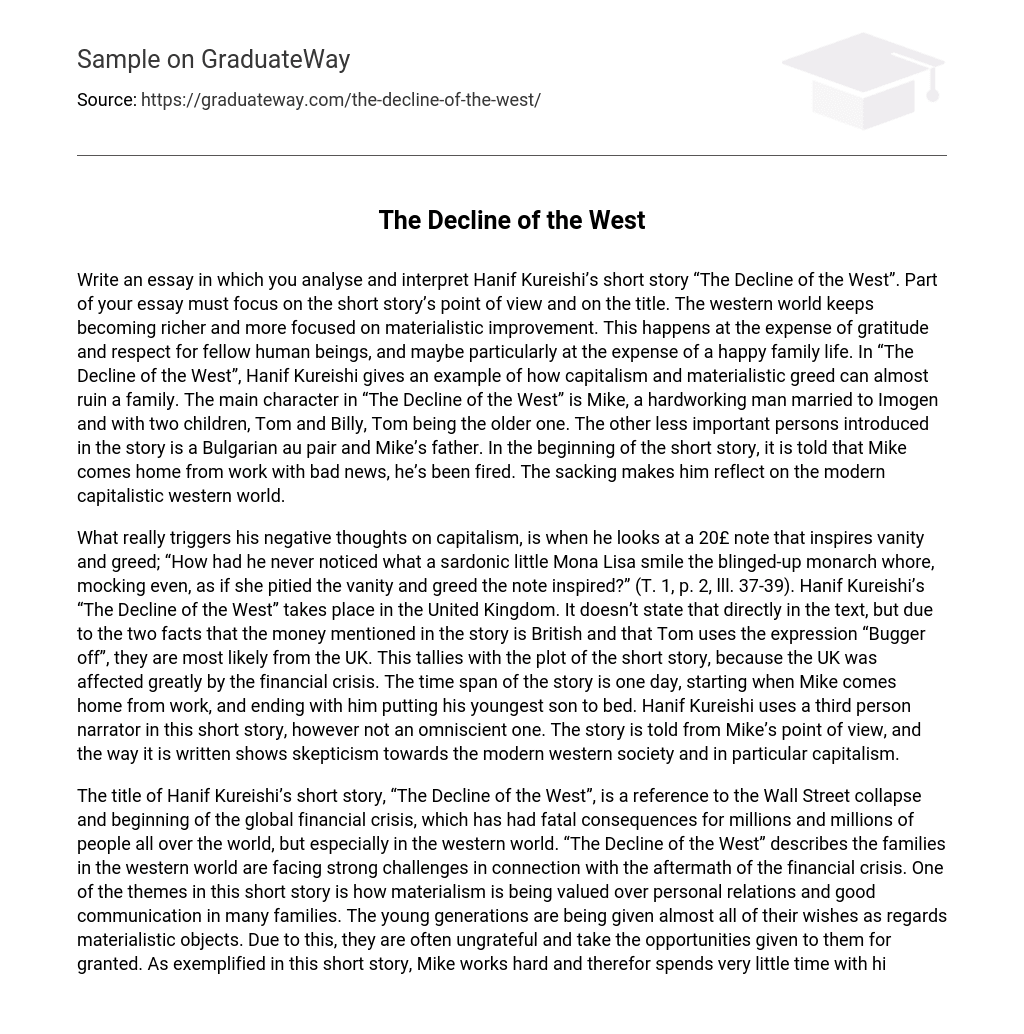In “The Decline of the West”, Hanif Kureishi gives an example of how capitalism and materialistic greed can almost ruin a family. The main character in “The Decline of the West” is Mike, a hardworking man married to Imogen and with two children, Tom and Billy, Tom being the older one. The other less important persons introduced in the story is a Bulgarian au pair and Mike’s father.
In the beginning of the short story, it is told that Mike comes home from work with bad news, he’s been fired. The sacking makes him reflect on the modern capitalistic western world. What really triggers his negative thoughts on capitalism, is when he looks at a 20£ note that inspires vanity and greed; “How had he never noticed what a sardonic little Mona Lisa smile the blinged-up monarch whore, mocking even, as if she pitied the vanity and greed the note inspired?” (T. 1, p. 2, lll. 37-39).
Hanif Kureishi’s “The Decline of the West” takes place in the United Kingdom. It doesn’t state that directly in the text, but due to the two facts that the money mentioned in the story is British and that Tom uses the expression “Bugger off”, they are most likely from the UK. This tallies with the plot of the short story, because the UK was affected greatly by the financial crisis. The time span of the story is one day, starting when Mike comes home from work, and ending with him putting his youngest son to bed. Hanif Kureishi uses a third person narrator in this short story, however not an omniscient one. The story is told from Mike’s point of view, and the way it is written shows skepticism towards the modern western society and in particular capitalism.
The title of Hanif Kureishi’s short story, “The Decline of the West”, is a reference to the Wall Street collapse and beginning of the global financial crisis, which has had fatal consequences for millions and millions of people all over the world, but especially in the western world. “The Decline of the West” describes the families in the western world are facing strong challenges in connection with the aftermath of the financial crisis. One of the themes in this short story is how materialism is being valued over personal relations and good communication in many families.
The young generations are being given almost all of their wishes as regards materialistic objects. Due to this, they are often ungrateful and take the opportunities given to them for granted. As exemplified in this short story, Mike works hard and therefor spends very little time with his children, however he makes a lot of money, and then compensates for the lacking presence by buying his children (and wife) almost whatever they want. But that is not enough to compensate, and deep down his children maybe still feel let down. Mike’s oldest son, Tom, is an example of this horrific ungratefulness among youngsters: “What have you ever done for me?” and “Are you joking? You’ve done nothing for me.” (T. 1, p. 2, ll. 62 & 64).
Another main theme in the short story is the downside and negative aspect of capitalism. In a capitalistic society each individual is very fragile, and now when loans and debt are becoming more and more spread you can fall even harder. This is well illustrated in the story where Mike uses more money than he has, to satisfy his family, and then he suddenly loses his job. Exactly this happened to lots and lots of people after and during the financial crisis which caused an obscure number of firings. One of the other negative aspects of capitalism being described is how Mike neglects being a role model for his sons and prioritizes making money to provide for his family by working many hours.
The increased unemployment has also lead to more suicide cases over the past years, which goes through Mike’s mind as well, on the day he’s got fired: “For a second he believed he was crashing onto his back and would break his neck. How easy it was to fall, and how tempting it was – suddenly would be best – to die!” (T. 1, p. 3, lll. 99-101). The text is very skeptical regarding capitalism, and of course it is not flawless, but the question is if the is an ideal ideology at all, I highly doubt it. There will always be global issues, and there will always be people criticizing the political system. Mistakes will be made, and the task is to learn from them and not make the same mistakes in the future.
Concerning the individual families, there should be less focus on materialism, resulting in spending less money, taking fewer loans, less debt and therefore less pressure to make money. But that is highly unrealistic since most people today simply need materialistic improvement, and much of the economy depend on people consistently buying new products.





